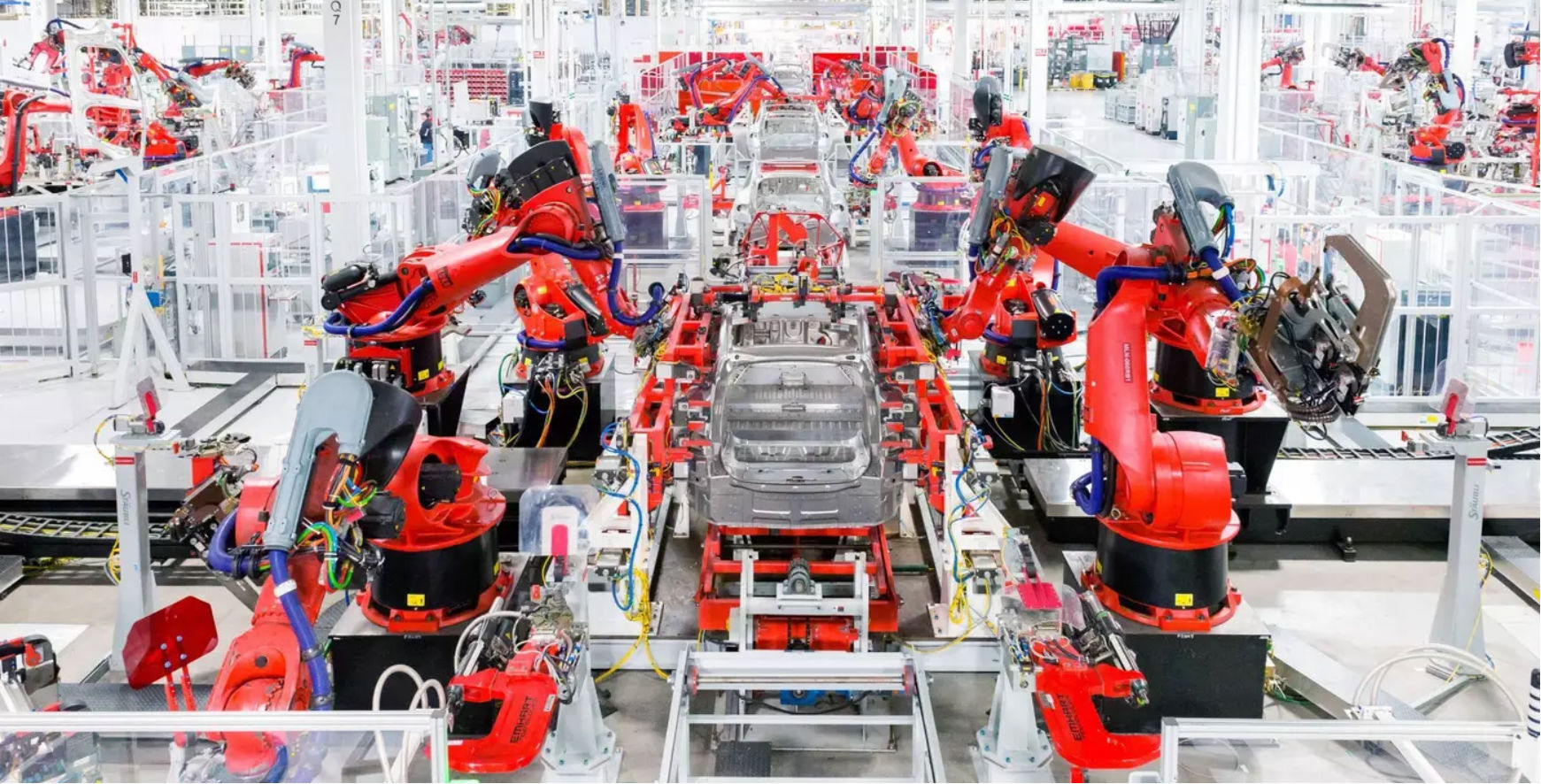

Investor's Corner
Tesla’s Q3 results and Wall St’s reaction: When record deliveries is bad news
Tesla’s (NASDAQ:TSLA) third-quarter results set new production and vehicle delivery records for the electric car maker. With a total of 96,155 electric cars produced and about 97,000 delivered between July and September, as well as an update that revealed that the company achieved record net orders in Q3, Tesla’s results were objectively impressive.
Yet, the market’s reaction to Tesla’s Q3 results was unforgiving. TSLA stock dipped over 4% in after-hours trading following the company’s release of its record third-quarter results. Bearish outlooks were shared by analysts covering the company once more, and questions about the demand for Tesla’s vehicles were rekindled.
A key driver of this negative narrative was Tesla’s reported miss of Wall Street’s expectations, as analysts polled by FactSet had an average estimate of 99,000 deliveries for Q3 2019. It should be noted that this estimate did not represent the latest consensus numbers from the greater number of analysts covering the company prior to the release of the Q3 production and delivery results.
FactSet usually utilizes about 10-12 analyst estimates to create a consensus, but over 20 analysts are covering Tesla. If one were to list the average estimates from 21 financial firms covering the electric car maker, one would see that Tesla’s “miss” might not really be a miss at all. In fact, it would appear that Tesla actually met Wall Street’s expectations.
Among New Street, Baird, BAML, Nomura, CSFB, Macquarie, Bernstein, DB, Cowen, JPM, OpCo, CE, MS, UBS, Wolfe, JMP, Needham, ISI, RBC, Barclays, and Wedbush, the actual delivery estimates among analysts covering the company was 94,422 units, comprised of 76,831 Model 3 and 17,591 Model S and X. That’s more conservative compared to Tesla’s 97,000 deliveries, comprised of 79,600 Model 3 and 17,400 Model S and X.
In a way, a good part of the bearish narrative that emerged following the release of the Q3 2019 results was due to a delivery target quoted in a leaked Elon Musk email that made the rounds just days before the end of the quarter. In the message, Musk rallied Tesla’s employees to push deliveries since the company has a chance of hitting 100,000 deliveries in Q3. That 100,000 delivery target was not official guidance from Tesla, but it seemed like it was practically considered as such by some analysts covering the electric car maker.
With Tesla’s official delivery figures falling short of the 100,000 mark, it became pretty easy to frame the narrative as a disappointing quarter for deliveries. The numbers are anything but, especially considering that sales among veteran automakers in the United States experienced a difficult third quarter.
Japanese carmakers Toyota and Honda, two of the US’ leading Asian automakers, suffered double-digit declines that were worse than analysts anticipated. Ford, the maker of America’s most popular vehicle, also saw its sales sink by 4.9% year-over-year. Compared to these, Tesla’s 16.2% year-over-year improvement in deliveries is quite impressive.
In the aftermath of Tesla’s Q3 2019 results and the unfortunate reaction of the market, is Tesla completely blameless? Not completely. It is unfortunate, but executives such as Elon Musk must realize that at this point, Tesla is playing a game that is not exactly fair, as evidenced by the CEO’s informal delivery target seemingly being considered as guidance by some analysts. In this light, emails with lofty forecasts might prove unwise in the future, or stronger safeguards must at least be placed to ensure that no internal emails are leaked.
As of writing, Tesla stock is trading -6.53% at $227.26 per share.
Disclosure: I have no ownership in shares of TSLA and have no plans to initiate any positions within 72 hours.
Elon Musk
Tesla analyst issues stern warning to investors: forget Trump-Musk feud

A Tesla analyst today said that investors should not lose sight of what is truly important in the grand scheme of being a shareholder, and that any near-term drama between CEO Elon Musk and U.S. President Donald Trump should not outshine the progress made by the company.
Gene Munster of Deepwater Management said that Tesla’s progress in autonomy is a much larger influence and a significantly bigger part of the company’s story than any disagreement between political policies.
Munster appeared on CNBC‘s “Closing Bell” yesterday to reiterate this point:
“One thing that is critical for Tesla investors to remember is that what’s going on with the business, with autonomy, the progress that they’re making, albeit early, is much bigger than any feud that is going to happen week-to-week between the President and Elon. So, I understand the reaction, but ultimately, I think that cooler heads will prevail. If they don’t, autonomy is still coming, one way or the other.”
BREAKING: GENE MUNSTER SAYS — $TSLA AUTONOMY IS “MUCH BIGGER” THAN ANY FEUD 👀
He says robotaxis are coming regardless ! pic.twitter.com/ytpPcwUTFy
— TheSonOfWalkley (@TheSonOfWalkley) July 2, 2025
This is a point that other analysts like Dan Ives of Wedbush and Cathie Wood of ARK Invest also made yesterday.
On two occasions over the past month, Musk and President Trump have gotten involved in a very public disagreement over the “Big Beautiful Bill,” which officially passed through the Senate yesterday and is making its way to the House of Representatives.
Musk is upset with the spending in the bill, while President Trump continues to reiterate that the Tesla CEO is only frustrated with the removal of an “EV mandate,” which does not exist federally, nor is it something Musk has expressed any frustration with.
In fact, Musk has pushed back against keeping federal subsidies for EVs, as long as gas and oil subsidies are also removed.
Nevertheless, Ives and Wood both said yesterday that they believe the political hardship between Musk and President Trump will pass because both realize the world is a better place with them on the same team.
Munster’s perspective is that, even though Musk’s feud with President Trump could apply near-term pressure to the stock, the company’s progress in autonomy is an indication that, in the long term, Tesla is set up to succeed.
Tesla launched its Robotaxi platform in Austin on June 22 and is expanding access to more members of the public. Austin residents are now reporting that they have been invited to join the program.
Elon Musk
Tesla surges following better-than-expected delivery report
Tesla saw some positive momentum during trading hours as it reported its deliveries for Q2.

Tesla (NASDAQ: TSLA) surged over four percent on Wednesday morning after the company reported better-than-expected deliveries. It was nearly right on consensus estimations, as Wall Street predicted the company would deliver 385,000 cars in Q2.
Tesla reported that it delivered 384,122 vehicles in Q2. Many, including those inside the Tesla community, were anticipating deliveries in the 340,000 to 360,000 range, while Wall Street seemed to get it just right.
Tesla delivers 384,000 vehicles in Q2 2025, deploys 9.6 GWh in energy storage
Despite Tesla meeting consensus estimations, there were real concerns about what the company would report for Q2.
There were reportedly brief pauses in production at Gigafactory Texas during the quarter and the ramp of the new Model Y configuration across the globe were expected to provide headwinds for the EV maker during the quarter.
At noon on the East Coast, Tesla shares were up about 4.5 percent.
It is expected that Tesla will likely equal the number of deliveries it completed in both of the past two years.
It has hovered at the 1.8 million mark since 2023, and it seems it is right on pace to match that once again. Early last year, Tesla said that annual growth would be “notably lower” than expected due to its development of a new vehicle platform, which will enable more affordable models to be offered to the public.
These cars are expected to be unveiled at some point this year, as Tesla said they were “on track” to be produced in the first half of the year. Tesla has yet to unveil these vehicle designs to the public.
Dan Ives of Wedbush said in a note to investors this morning that the company’s rebound in China in June reflects good things to come, especially given the Model Y and its ramp across the world.
He also said that Musk’s commitment to the company and return from politics played a major role in the company’s performance in Q2:
“If Musk continues to lead and remain in the driver’s seat, we believe Tesla is on a path to an accelerated growth path over the coming years with deliveries expected to ramp in the back-half of 2025 following the Model Y refresh cycle.”
Ives maintained his $500 price target and the ‘Outperform’ rating he held on the stock:
“Tesla’s future is in many ways the brightest it’s ever been in our view given autonomous, FSD, robotics, and many other technology innovations now on the horizon with 90% of the valuation being driven by autonomous and robotics over the coming years but Musk needs to focus on driving Tesla and not putting his political views first. We maintain our OUTPERFORM and $500 PT.”
Moving forward, investors will look to see some gradual growth over the next few quarters. At worst, Tesla should look to match 2023 and 2024 full-year delivery figures, which could be beaten if the automaker can offer those affordable models by the end of the year.
Investor's Corner
Tesla delivers 384,000 vehicles in Q2 2025, deploys 9.6 GWh in energy storage
The quarter’s 9.6 GWh energy storage deployment marks one of Tesla’s highest to date.

Tesla (NASDAQ: TSLA) has released its Q2 2025 vehicle delivery and production report. As per the report, the company delivered over 384,000 vehicles in the second quarter of 2025, while deploying 9.6 GWh in energy storage. Vehicle production also reached 410,244 units for the quarter.
Model 3/Y dominates output, ahead of earnings call
Of the 410,244 vehicles produced during the quarter, 396,835 were Model 3 and Model Y units, while 13,409 were attributed to Tesla’s other models, which includes the Cybertruck and Model S/X variants. Deliveries followed a similar pattern, with 373,728 Model 3/Ys delivered and 10,394 from other models, totaling 384,122.
The quarter’s 9.6 GWh energy storage deployment marks one of Tesla’s highest to date, signaling continued strength in the Megapack and Powerwall segments.

Year-on-year deliveries edge down, but energy shows resilience
Tesla will share its full Q2 2025 earnings results after the market closes on Wednesday, July 23, 2025, with a live earnings call scheduled for 4:30 p.m. CT / 5:30 p.m. ET. The company will publish its quarterly update at ir.tesla.com, followed by a Q&A webcast featuring company leadership. Executives such as CEO Elon Musk are expected to be in attendance.
Tesla investors are expected to inquire about several of the company’s ongoing projects in the upcoming Q2 2025 earnings call. Expected topics include the new Model Y ramp across the United States, China, and Germany, as well as the ramp of FSD in territories outside the US and China. Questions about the company’s Robotaxi business, as well as the long-referenced but yet to be announced affordable models are also expected.
-

 Elon Musk2 days ago
Elon Musk2 days agoTesla investors will be shocked by Jim Cramer’s latest assessment
-

 News1 week ago
News1 week agoTesla Robotaxi’s biggest challenge seems to be this one thing
-

 Elon Musk2 weeks ago
Elon Musk2 weeks agoElon Musk slams Bloomberg’s shocking xAI cash burn claims
-

 News2 weeks ago
News2 weeks agoTexas lawmakers urge Tesla to delay Austin robotaxi launch to September
-

 Elon Musk1 week ago
Elon Musk1 week agoFirst Look at Tesla’s Robotaxi App: features, design, and more
-

 Elon Musk2 weeks ago
Elon Musk2 weeks agoTesla Robotaxis are becoming a common sight on Austin’s public roads
-

 Elon Musk2 weeks ago
Elon Musk2 weeks agoxAI’s Grok 3 partners with Oracle Cloud for corporate AI innovation
-

 Elon Musk2 weeks ago
Elon Musk2 weeks agoSpaceX President meets India Minister after Starlink approval















